#Lord of Beleriand
Text

Elu Greycloak's grey (silver) cloak.
Thingol cosplay by me, photo by Noldorheart (IG)
#thingol cosplay#elu thingol#elwe#elwe singollo#thingol#silmarillion#silmarillion cosplay#tolkien cosplay#the silmarillion#lotr cosplay#tolkien#jrr tolkien#King of Doriath#Lord of Beleriand#lord of doriath#doriath#menegroth
320 notes
·
View notes
Text

Reposted without comment.
#of beleriand and its realms#silmarillion#tolkien#jrr tolkien#lord of the rings#lotr#lotr rop#lotr trop#fantasy#lotr memes#tolkien memes#the silmarillion#the silm#the silm fandom#silmamemes
680 notes
·
View notes
Text

the joy of his youth has burned away and in its place is wrath
#silm#silmarillion#amras#i really like how his hair turned out#imagine ambarussa being all happy and playful and legolas-y in valinor#spending most of their time running around the woods with celegorm and aredhel#but then in beleriand after amrods death#amras is only known as the grim lord of the wilds haunted by a ghostly figure
286 notes
·
View notes
Text
I’ve read some criticisms that Beren doesn’t listen to Lúthien and keeps trying to leave her behind even when she’s proven herself capable … and I’m like … are you even aware of Beren’s life story?
This man has lost everything he’s ever loved.
He had to part ways with his mother and sister for their safety, and then came back from a hunt to find his entire clan brutally murdered, including his father. He tracked down those responsible to take revenge and get his father’s ring back, because what else could he do? What purpose did he have without his family and his comrades? What was the use when the enemy was hunting him down 24/7? While his survival instincts won out, he was still a man who had no hope, afraid of love and attachment after what he’d lost, completely alone and isolated for years.
Then he met Lúthien. And she made him want to live. She gave him something to fight for: her. He found a new purpose, a new dream: he could be her husband, he could give her love and a family, happiness and freedom, everything she deserves.
He invoked Finrod’s promise to his father just so he could achieve his new goal…and how did that turn out? His entire group of helpers got captured and killed, because of him, including his dear friend. Every time he gets attached to someone in the heat of danger, he loses them. Every time. The poor guy must feel like he’s cursed.
And suddenly here’s Lúthien, in the middle of Sauron’s fortress, targeted by the sons of Fëanor, vowing to follow him into the lion’s mouth to end all lion’s mouths that is Angband.
And Beren just…can’t bear it. She is his hope, his light, his love, his Tinúviel…he can’t let that “curse” on him affect her. He can’t drag her into further danger when that has spelled doom for everyone else he’s loved. Not when the enemy has proven time and again that he can and will conquer everyone Beren cares for, no matter how strong.
He pushes her away not because he doesn’t respect her, but because he does.
He insists that she go back to Doriath and he go on alone, NOT because he thinks she can’t handle herself - he knows her far too well to believe that - but because he can’t lose her too.
#beren x luthien#beren and luthien#lotr#jrr tolkien#lotr books#lord of the rings#the silmarillion#first age#tolkien legendarium#luthien#lúthien#beren#beren erchamion#luthien tinuviel#lúthien tinúviel#beleriand#finrod#finrod felagund#barahir#sons of feanor#sauron#thangorodrim#tolkien couples#angband
64 notes
·
View notes
Text
sexiest silm line contenders
"Beware therefore how you princes of the West bear yourselves; for I am the Lord of Beleriand, and all who seek to dwell there shall hear my word."
"But Maedhros laughed, saying: 'A king is he that can hold his own, or else his title is vain.'"
#they put these 2 bastards on the same page and then ask why i'm not normal....#thingol#maedhros#silmarillion#my posts#this would have been a poll but 1. i couldn't make myself choose between them so how can i ask another to#2. i want the non-thingolfuckers to genuinely imagine a tall ancient guy with maia beauty sparkle magic saying 'i am the lord of beleriand'
388 notes
·
View notes
Text
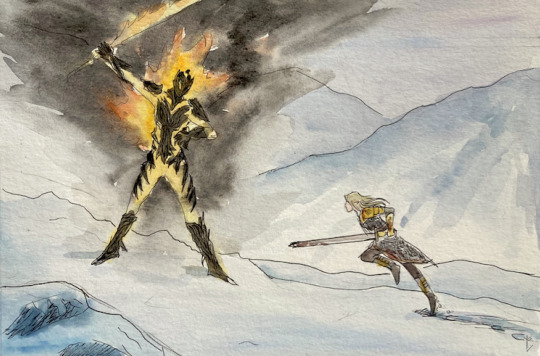
Glorfindel and the Balrog
“Many are the songs that have been sung of the duel of Glorfindel with the Balrog upon a pinnacle of rock in that high place... “
The Silmarillion, Chapter 23 : of Tuor and the Fall of Gondolin, 1977, J.R.R Tolkien,
Glorfindel is one of my favorites Elves from Tolkien's books and I really wanted to drawing and paint his last fight when everything is lost.
Gondolin, the last Elven sanctuary of Beleriand is no more. Its people are dead or trying to espace by the mountains with despair and fear, as Morgoth's forces hunt them down.
And then came Glorfindel, an Elf chieftain, who is certainly weakened by the Siege and perhaps knowing that this fight againts the Balrog will bring their both end, but he will give a chance to his people and friends to escape to safety.
Glorfindel is I think, one of the greastest, selfless and bravest hero of Middle-Earth. Not just during that fight (which that will allowed to Eärendil to live and bring back hope on Middle-Earth) but also during the events of The Lord of the Rings... to help once more the Free People in their darkest hours.
————————————————————————————————
Artwork is made by @lucyfloyenworkshop
. Please don’t use/repost/trace my artworks without my permission
. Reblog (with my copyright) and likes are welcomed :-)
#middle earth#silmarillion#lord of the rings#lotr#beleriand#glorfindel#balrog#elf#tolkien#tolkien art
59 notes
·
View notes
Text
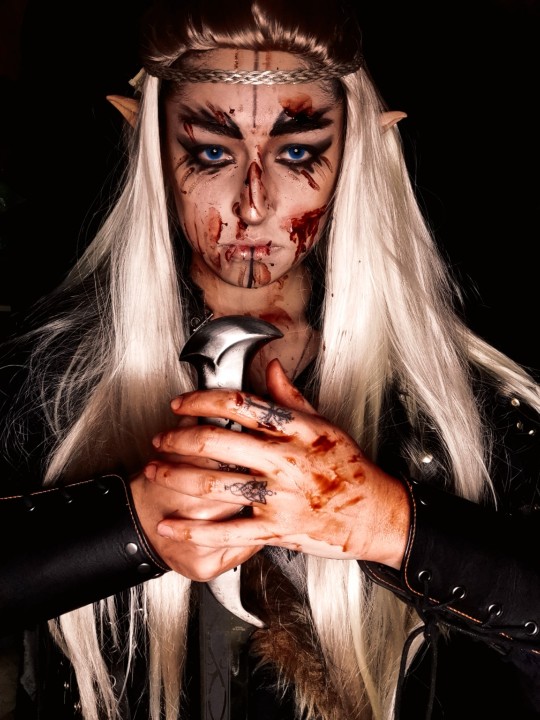
Tyelkormo Feanorian
#celegorm#tolkien#lotr#silmarillion#middle earth#cosplay#lotr cosplay#the lord of the rings#the lord of the rings cosplay#celegorm cosplay#tyelkormo#silmarillion fandom#silmarilion cosplay#beleriand#noldor#elf cosplay#elf#book cosplay#book characters#feanorians#sons of feanor
99 notes
·
View notes
Text
Elrond: *Holds up a book.* TADA!
Maedhros: Where do you keep finding that?
Maglor: I thought we burned that.
Maedhros: We did.
Elrond: Nothing can stop the need for knowledge.
#It's a book on the early days of them being in Beleriand and has the exact wording for the oath in it#They tried to burn all the books that had the oath's wording in it#but Elrond keeps finding more#at least he's good at finding them so they can make sure all of them are burned#lotr#lord of the rings#incorrect lord of the rings quotes#silmarillion#incorrect silmarillion quotes#incorrect quotes#elrond#lotr elrond#elrond peredhel#maglor#lotr maglor#maedhros#lotr maedhros
136 notes
·
View notes
Photo


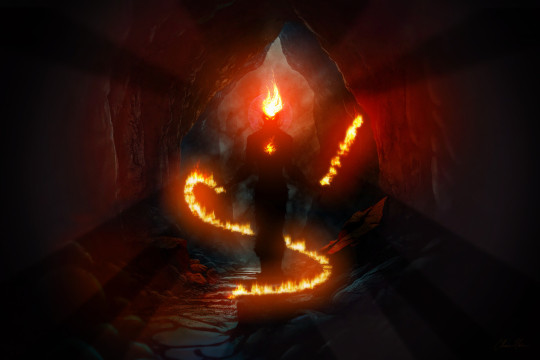

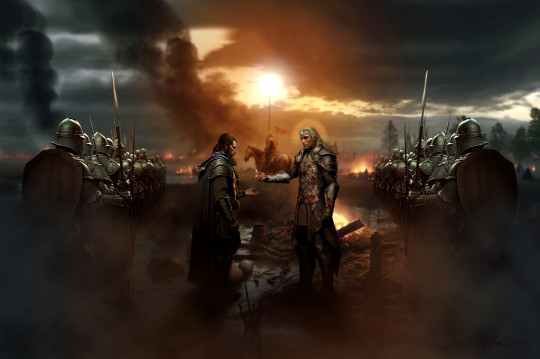

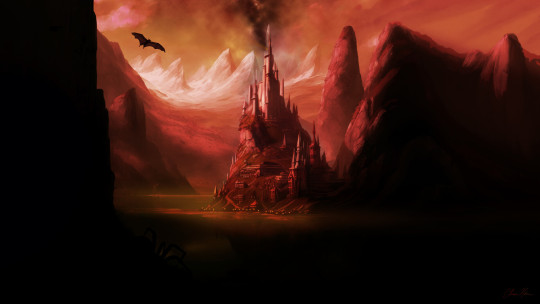
Legendarium by Christopher Nelson
Sauron: The First Age
"Sauron was become now a sorcerer of dreadful power, master of shadows and of phantoms, foul in wisdom, cruel in strength, misshaping what he touched, twisting what he ruled, lord of werewolves; his dominion was torment."
Revealed
"Then Sauron stripped from them their disguise, and they stood before him naked and afraid. But though their kinds were revealed, Sauron could not discover their names or their purposes."
Gaze of the Balrog
Finrod Felagund
Finrod, also known fully as Finrod Felagund, was a Ñoldorin Elf who was born in Aman, He was King of Nargothrond and the eldest son of Finarfin and Eärwen, and the brother of Galadriel, Angrod and Aegnor. Finrod was one of the noblest elves of the House of Finarfin and a friend of Men.
Finrod` oarth to Barahir
"It was Barahir of the House of Bëor who saved his life, and Finrod swore an oath of abiding friendship and aid in every need to Barahir and all his kin. As a token he gave Barahir his ring, which became known as the Ring of Barahir."
Minas Tirith of Beleriand
Minas Tirith was the tower on the island of Tol Sirion that guarded the Pass of Sirion. It was built by Finrod Felagund to prevent the forces of Morgoth from invading Beleriand from the plains of Ard-galen.
Isle of Werewolves
After Finrod built Nargothrond, he handed over control of the watchtower of Minas Tirith to his nephew, Orodreth, before it was captured by Sauron and renamed Tol-in-Gaurhoth, the "Isle of Werewolves".
#tolkien#jrrt#jrr tolkien#jrrtolkien#the silmarillion#the hobbit#hobbit#The Lord of the Rings#lord of the rings#lotr#sauron#finrod felagund#finrod#felagund#barahir#Minas Tirith#beleriand#balrog#tol-in-gaurhoth
288 notes
·
View notes
Text
<- experiencing shrimp emotions (listening to the return of the king ost: battle of the pelennor fields)
#rimi talks#the violin solo does things to me man...#you ever think abt that one throwaway line in yj98 that confirms kon's into lotr#they did that for me specifically.#i know in my heart that while he's primarily in wendy fandom...#kon has definitely written star wars. star trek. and silmarillion fanfic#he's one of those guys making scifi aus about the silm. girdle of melian as a cloaking device. thangorodrim black hole something something.#god fuck i want to watch/read lotr again. and the silm. and home. aakjshguarhgh#wheres my copy of the lays of beleriand i NEED to reread...#<- i experience this literally every time i listen to the lotr ost#lord the horn section before the violin solo. WAILS into my hands
29 notes
·
View notes
Text
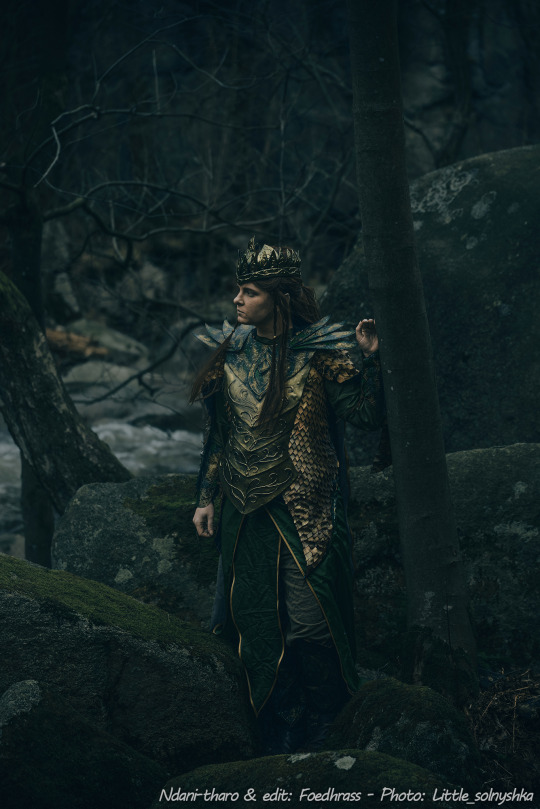
While the previous photos of my newest Tolkien cosplay (Ndani-tharo/Denethor of the Nandor) showcase the colors of the costume, this edit is closer to how it probably would have looked, since Ndanitharo lived and died before the Sun and the Moon first rose. I imagine the elves would have been able to see better than we do in a moonless night, so I didn’t edit everything just grey or excessively dark. ;)
Cosplay & edit: Foedhrass
Photo: little_solnyshka
#tolkien silmarillion#Ndanitharo#Denethor#denethor cosplay#denethor of the nandor#nandor cosplay#nandor elves#Nandor#silmarillion#tolkien#silmarillion cosplay#tolkien cosplay#middle-earth#the silmarillion#cosplay#lord of the rings#elves#Ossiriand#Beleriand
88 notes
·
View notes
Text
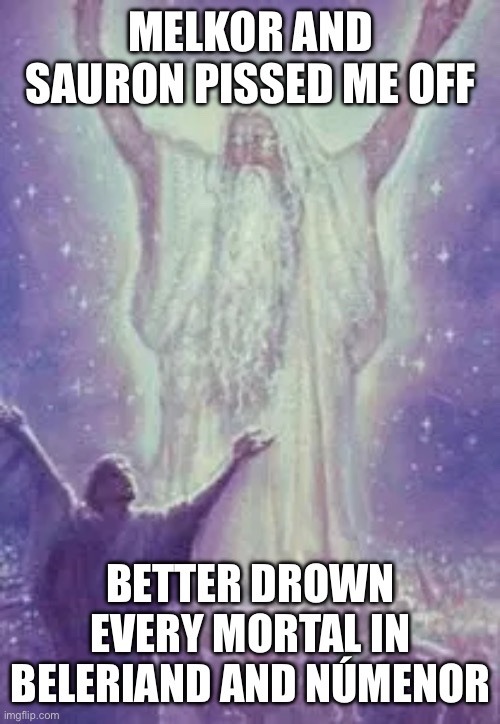
I love this painting, the way Eru Ilúvatar is staring down at Melkor like DUDE WHAT THE FUCK.
#eru is the real villain#eru iluvatar#bad guy eru#beleriand#numenor#genocide#silmarillion#the silmarillion#the silm#lord of the rings#the hobbit#jrr tolkien#tolkien#lotr#fantasy#lotr memes#tolkien memes#lord of the rings meme
68 notes
·
View notes
Text
I Read The Silmarillion So You Don't Have To, Part Six
Previous part.
Chapter 14: Of Beleriand and its Realms
In which we get a geography lesson.
Had enough political geography yet? I’m not going to summarize this whole chapter, because it’s exactly what it says on the tin: it describes the realms of Beleriand. It is impossible to make sense of this chapter without looking at the map. And most of it is information that we already know. For the sake of being complete, and of helping myself keep track of all this information, here’s what’s important:
The northern land where the Noldor live is called Hísilomé (in Quenya) or Hithlum (in Sindarin), both of which mean “Land of Mist.” It’s called that because of all the smoke that comes from Angband blows over it. It’s co-ruled by Fingolfin and his son Fingon.
In the westernmost part of Beleriand, on the coast, is a land called Nevrast. Turgon, Fingolfin’s other son, rules there. It’s completely surrounded by mountains in a kind of triangular shape, which is not how mountains work. Its population consists of an even mix of Noldor and Sindar.
Remember how I said there were two Minas Tiriths? The one we know is the second one, in Gondor, many thousands of years later. The first one is a watchtower built in a small mountain pass on the River Sirion, here in Beleriand. Finrod built it, but he leaves it in the care of his brother Orodreth. (“Minas Tirith” just means “guard tower” in Sindarin, so that’s why there’s two fortresses with that name.)
The River Sirion flows south. West of it is the realm of Nargothrond, ruled by Finrod, and east of it is Doriath, the forest ruled by King Thingol of the Sindar.
The eagles live on a chain of mountains called the Crissaegrim. (Yes, the name of the best sword in Castlevania: Symphony of the Night is a reference to this! )
In the eastern part of Beleriand is the River Gelion, running parallel to the Sirion. It has six rivers that flow into it. That land is called Ossiriand, and the Green Elves live there. Directly north is Thargelion, where Caranthir (another one of Fëanor’s sons) has his castle.
In the northeast is Lothlann, which is the plain that’s most exposed to Morgoth. Maedhros has his castle there.
I feel like this chapter should have come before the last one. It describes a bunch of places which have already been referenced in relation to each other. So, why are they being described now, after they’ve already become relevant to the story? Like, for example, the Thangorodrim. In this chapter, we’re told that the Thangorodrim are mountains made out of the refuse from Morgoth’s excavations while he was building his fortress. That would have been nice to know before Mædhros was nailed to the face of them. Back in the last chapter, the text just sort of assumed that we already know what the Thangorodrim are. I gathered from the context that they’re mountains and that they’re connected to Morgoth. I guess that’s all one really needs to know, right? No story actually needs this detailed a description of the geography… but this book is 300 pages of straight infodumping. So, we get all the geography, and out-of-order.
Okay, now that that’s over, let’s move on to something interesting!
Chapter 15: Of the Noldor in Beleriand
In which a legendary city is built, and Thingol hears all the dirt on the Noldor.
Remember Turgon? He’s Fingolfin’s son and Fingon’s brother, and he received a prophetic dream from Ulmo, the Vala of Water. The dream led him to finding a hidden valley in the north of Beleriand. Feeling homesick for Valinor, Turgon decided to build a city on the hill in the center of the valley, which would be like a New Tirion — the original city of the Noldor, replicated in Middle Earth!
Turgon brought many of the most skilled Noldor to the valley to build the city, and then ditched them to live comfortably in Nevrast while they did the work for him. After fifty-two years, the city was complete. Turgon named it Ondolindë, which means “The Rock of the Music of Water” in Quenya. But it’s better known by its Sindarin name, Gondolin.
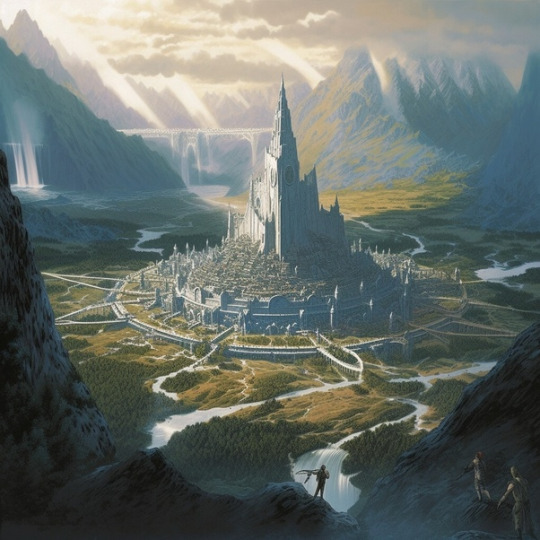
The Hidden City of Gondolin by Aesthetica
Gondonlin is the Elven City (which is why it’s kind of surprising to learn that it’s a copy of an even greater one). It’s gorgeous and bright white, with beautiful fountains and gardens. The giant tower in the middle is Turgon’s palace, and in it he creates images of the Two Trees of Valinor, wrought out of literal silver and gold; the gold one is called Glingal, and the silver one is called Belthil.
The most wondrous treasure of Gondolin is, of course, Turgon’s beautiful daughter Idril Celebrindal. Like Galadriel, she almost has the light of the Gold Tree, Laurelin, in her hair. So, that makes her one of the prettiest Elves alive.
Ulmo promises to protect Gondolin, and ensure that no one will ever be able to find it against his will. But he straight-up tells Turgon not to get too attached to Gondolin. (Actually, he says “the work of thy hands” — lol, Turgon did nothing to help build it.) Ulmo also tells Turgon that his little safe-haven isn’t going to protect him from the Curse, so, he can expect treachery within Gondolin’s walls at some point. The only hope is going to be someone who comes from the west.
What Could Possibly Go Wrong?
A third of the Noldor and even more of the Sindar pass secretly into Gondolin, apparently disappearing overnight. (Nevrast is completely abandoned) Then the gates are shut.
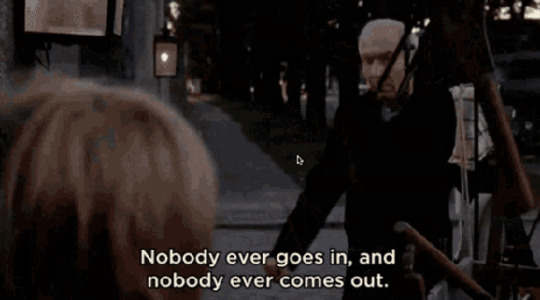
Meanwhile, Galadriel is enjoying her life in the court of Thingol. Remember, she’s one of the only Noldor Elves who’s allowed to be there, past the magic wall. She has long talks with Queen Melian, the Maia, about Valinor. But Galadriel refuses to say anything about how and why the Two Trees died. Melian can tell that something’s wrong, and asks Galadriel what happened. Galadriel says that she wants to put the past behind her, and try to have some hope for the future.
Melian presses her — she knows better than to think, as everyone else does, that the Noldor were sent by the Valar to swoop in and save her people from being assaulted by Orcs. She notes that the Noldor don’t speak of the Valar at all; they just sort of pretend that the Valar don’t exist. From that, she concludes that the Noldor aren’t messengers, they’re exiles. Something went badly wrong.
Galadriel caves, and tells Melian about the Silmarils, about how Morgoth stole them, about the death of Finwë, and about how the Noldor left Valinor willingly despite the Valar not wanting them to leave. She neglects to mention any of the worse stuff, like the Oath that Fëanor’s sons took, or the kinslaying, or the Curse, or the burning of the ships. Melian senses that she’s still holding back information. She doesn’t press Galadriel any more, but she does tell her husband Thingol about the Silmarils.
Only Melian is really able to put two and two together, and realize just what a big-ass deal the Silmarils really are. They contain the last remaining Light of Valinor, and if Morgoth has them, then any attempt at recovering them is almost inherently pointless. It’s going to take far more power than Elves have to take the fight to him. Fëanor tried that, and now he’s dead, even though he was one of the greatest Elves. If anyone else tries to take on Morgoth, they could risk destroying the world in the process. For better or worse, the fate of Arda is tied up with that of the Silmarils.
Thingol is distraught to hear that Finwë is dead, and figures he was right not to trust the Noldor. The only silver lining is that at least the Noldor will make good allies against Morgoth, because peace with him doesn’t seem to be an option. Melian tells him to be wary of Fëanor’s sons. She could read between the lines and figure out what Galadriel wasn’t telling her. Fëanor’s sons are all guilty of crimes against the Valar, their own families, and even themselves. There’s a lot of unresolved tension between them that’s only dormant for the time being, and it can only get worse from here. Thingol dismisses her concerns. All he cares about is that Fëanor’s sons will give him his best shot at taking down Morgoth. Whatever drama is between them is their business.
Melian and Thingol decide not to speak of this again, but rumor spreads amongst the Sindar about what the Noldor did to get kicked out of Valinor. Many of these rumors are spread by Morgoth. Spreading rumors was how he set the Noldor on their dark path in the first place, and the Sindar were too naïve to know not to believe rumors. Círdan, however, catches wise. He perceives that the rumors are being spread maliciously, but doesn’t think to blame Morgoth. He assumes that the Noldorin princes are spreading rumors to slander each other. He sends messengers to Thingol to tell him about the rumors.
By pure bad luck, Finrod and his brothers happen to be there in Thingol’s court, visiting their sister Galadriel. So, Thingol hears all the rumors while they’re there. He explodes at Finrod for having lied by omission. Finrod protests that he’s never done anything to Thingol, nor have any of the other Noldor. Thingol cooly responds that all the Noldor have blood on their hands for kinslaying, but they don’t try to defend themselves or seek pardon. Finrod has nothing to say to that.
But Angrod, his brother, speaks up. Angrod blames Fëanor for the whole thing. The other Noldor are really the victims in this situation, he claims, because they were intoxicated by Fëanor’s words, and then Fëanor abandoned them to freeze to death. The reason why Thingol hasn’t heard any of this before is because it’s an act of treason against the Noldor to talk about it. Surely, Thingol can understand that?
Melian is less than impressed. She points out that, according to Angrod’s own account, Mandos doomed all the Noldor. That means that he and his siblings are just as damned as the rest of them. They're all affected by the Curse.
Thingol is silent for a moment. Then he tells Angrod and co. to get out of his house. He’s not going to shut them out forever, because they’re family. He’s also going to maintain his friendship with Fingolfin’s people, because he needs them to take down Morgoth. But, he refuses to hear their language be spoken in his presence, and he commands that none of the Sindar use it, either. Anyone who speaks Quenya will be branded a kinslayer.
So, now you know why Sindarin is the dominant Elven language in Middle-earth.
That sort of puts a damper on Quenya; it seems like such a magical and elevated language, but now it’s associated with the Noldor’s crimes. I suppose that makes sense, if the Noldor are the ones who primarily speak it. But it also seems a bit draconian for Thingol to consider someone guilty of a serious crime just for speaking Quenya.
Quenya therefore ceases to be a spoken language, and becomes mainly used for writing lore or singing old songs. It’s the Elvish version of Latin.
After that, things become a little awkward for Galadriel in Thingol’s court, so she leaves it and comes to live with her brother Finrod in Nargothrond. She asks him why he hasn’t taken a wife yet. Finrod gets a flash of premonition, and tells her that nothing of his realm will remain to be inherited by a son. But the real truth is that he left his true love, Amarië, in Valinor.
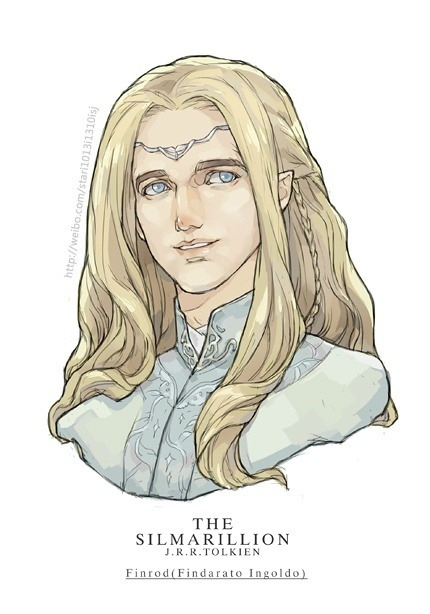
Finrod by _star热爱生活呀巴扎嘿
Chapter 16: Of Maeglin
In which we meet an edgy bad-boy Elf.
Did you remember that Fingolfin had a daughter? It’s okay, I didn’t either. Her name is Aredhel Ar-Feiniel, and she’s known as the White Lady. She lives with Turgon, her brother, in Nevrast. She follows him to Gondolin, but she doesn’t really like it there. She prefers to wander freely in forests or ride horses in the fields, and she can’t do that if she’s effectively imprisoned by mountains and high walls on all sides.
Two hundred years pass (which I’m guessing is like twenty in elf years), and she finally asks Turgon if she can leave. Turgon doesn’t want her to leave. If anyone leaves Gondolin, then that risks revealing its existence to everyone else in the world, and that would be bad. Eventually he gives in, but tells her that she’s only allowed to meet with Fingon, their brother. Aredhel takes offense at this. She’s Turgon’s sister, not his lackey, and he has no right to tell her where to go or what to do. She leaves, and Turgon tells three of his lords to go with her to protect her, with the condition that they come straight back.
Aredhel immediately decides not to go see Fingon. She wants to find the sons of Fëanor (Maedhros, Caranthir, and co.), because they’re her friends. She tries to cut through the forest of Doriath, but the Sindar turn her away, because Thingol hates the Noldor now. She has to go around the long way. That way is dangerous, and polluted with poisonous water and evil creatures left behind by Morgoth and Ungoliant. Aredhel gets lost, and her escorts barely escape with their lives. They make it back to Gondolin, but have to give the terrible news to Turgon that they lost their charge along the way.
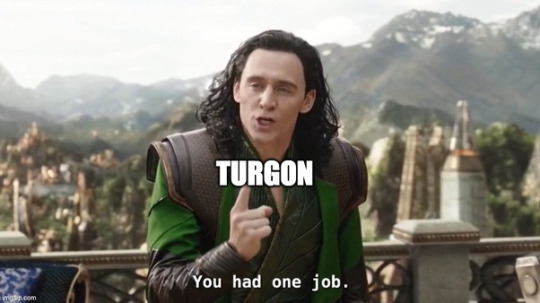
Turgon is grief-stricken and very, very frustrated. Aredhel survives, though, and ends up in Himlad, the land of Fëanor’s sons Celegorm and Curufin. They’re away, traveling further east with their brother Caranthir, but Aredhel is welcomed by Celegorm’s people.
Aredhel enjoys herself for a while, wandering in the forests like she used to, but a year passes and Celegorm still hasn’t come back. She starts wandering further and further, until she ends up in a small forest on the eastern edge of Doriath.
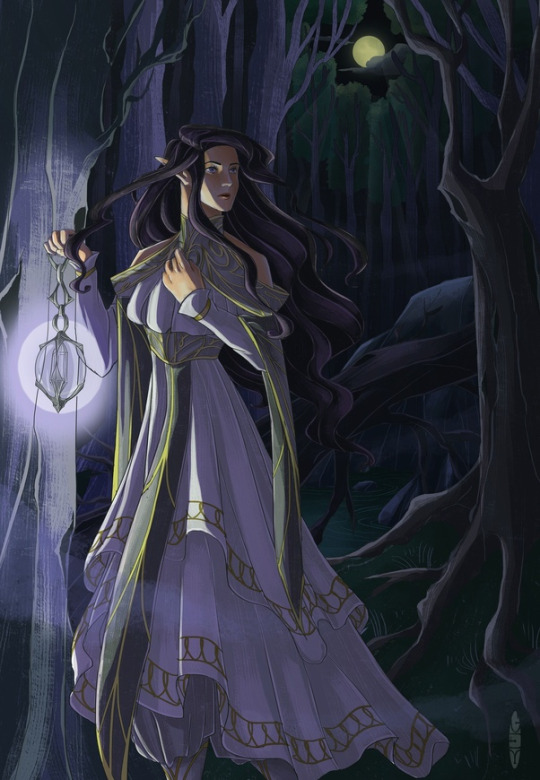
Aredhel lost in the dark forest by @gemennair
This forest is the darkest of all the forests in Beleriand, and it’s inhabited by an elf called Eöl, known as the Dark Elf. Eöl isn’t actually a Dark Elf (Moriquendi); he’s one of the Sindar, but he left Doriath when the magic wall went up. Now he’s basically nocturnal. He blames the Noldor for the return of Morgoth. He mostly doesn’t interact with other Elves, but he does like Dwarves, and gives them information about the Elves when they ask. The Dwarves taught him metalwork in exchange, and he designed a special kind of armor that’s thin and light and yet repels all weapons. It’s jet black, and he wears it all the time.
Skulking in the shadows, Eöl sees Aredhel enter his forest, and he lusts after her. He enchants the forest so that she can’t find her way out, and the forest always turns her towards the center. (Kind of like the Old Forest does to the Hobbits while they’re trying to pass through it in Fellowship.) When she finally arrives at Eöl’s house, tired from wandering, he welcomes her in. And that was the last her family heard of her for a long time.
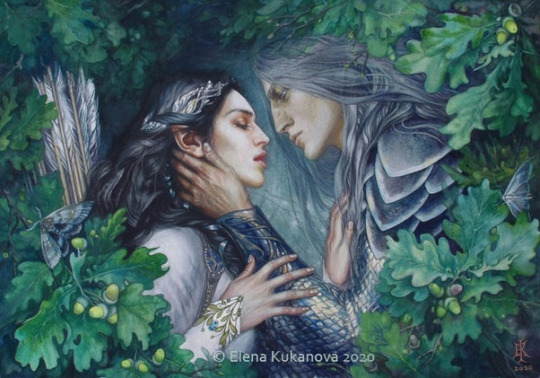
Aredhel and Eöl by Elena Kukanova
It’s unknown exactly how Aredhel responded to Eöl’s intent to marry her. Maybe she fell in love with this edgy bad-boy elf in his spooky forest. But she landed in kind of the same situation that she was in back in Gondolin. Eöl lets her wander, at least, but only at night. He also forbids her from seeking out the other Noldor, and the sons of Fëanor in particular, which is what she wanted to do in the first place. Honestly, their relationship reminds me superficially of Hades and Persephone.
Eöl and Aredhel have a son. Secretly, Aredhel gives him a name in her forbidden native tongue of Quenya — Lómion, which means “Child of the Twilight.” Eöl doesn’t give him a name until he turns twelve, and that name is Maeglin, which means “sharp glance.” Maeglin grows up to resemble the Noldor, but he is more like his father in temperament.
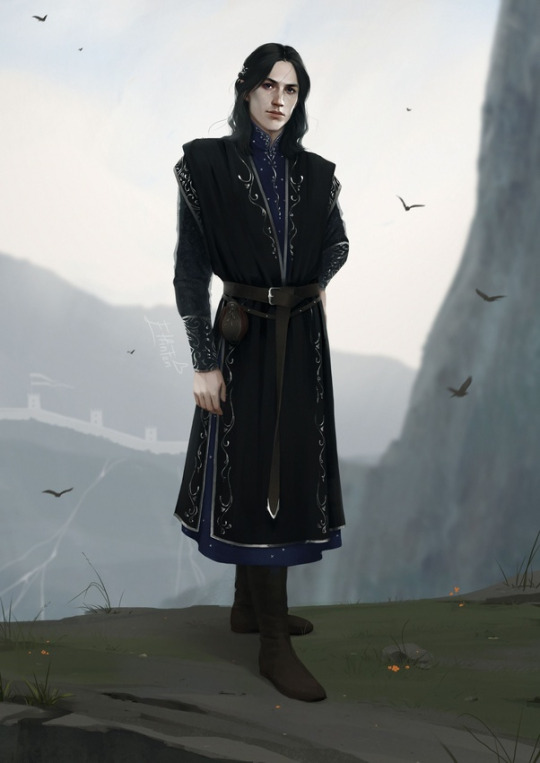
Maeglin by @elfinfen
His father takes him to meet the Dwarves, who teach him mining, smithing, and metalwork. But Maeglin has a special relationship with his mother, and enjoys hearing her tales of Valinor and the House of Fingolfin. He especially likes hearing about Turgon and Gondolin.
In telling all these stories, Aredhel realizes just how much she misses Gondonlin. She wonders how she could have left in the first place. After such a long time in the dark shadows of the forest, the bright walls and fountains of Gondonlin seem lovely. But she refuses to tell Maeglin where Gondolin is, because that is such an important secret.
Eöl is also mad that Maeglin wants to meet his Noldor relatives. He’s an old enough Sinda to still identify himself as a member of the Teleri, and therefore, he thinks of his distant relatives in Valinor as his own people. He forbids Maeglin from seeking out the Noldor for the same reason that King Thingol banned Quenya — he takes the Noldor’s crime of kinslaying personally. (He probably should have thought of that before deciding to marry Aredhel, but whatever.) Maeglin, like any edgy teenager, does not take this well. He stops going to visit the Dwarves with his father, and Eöl starts to distrust his own son.
One summer, when Eöl is gone on one of his visits to the Dwarves, Maeglin suggests to his mother that they go to Gondolin. What’s the point of sticking around? She wants to see her people again, and Maeglin has learned all he can from Eöl. There’s no sense in remaining trapped in a dark forest with nothing else to do. So, they up and leave.
When Eöl gets back, he is furious to find them gone. Despite his hatred of the sun, he chases after them, but he’s waylaid by Curufin, one of Fëanor’s sons. Curufin asks what he’s doing there. Eöl lies, saying that his wife and son were on a casual visit to their relatives, and that it only makes sense that he should be with them. Curufin sees right through him, and tells him that they’re already gone. He gives Eöl permission to pass through, but tells him that the sooner he leaves, the better.
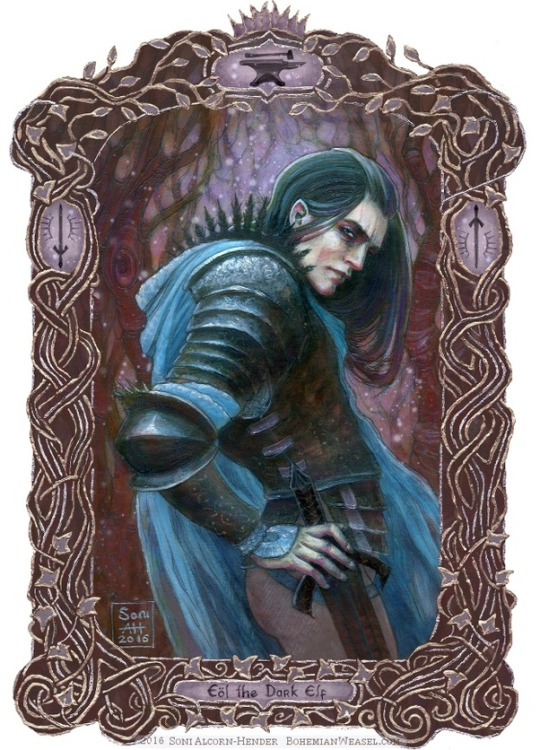
Eöl by @bohemianweasel
Eöl snipes that this isn’t the proper way to treat a kinsman. Curufin replies that it’s pretty rich for Eöl to ride upon his wife’s title when he’s been keeping her imprisoned in a forest for decades. If he wants the honor due to a kinsman, he should have acted like one. Curufin also gives Eöl a warning: He should return to his forest now. If he pursues his family, he’ll never come back.
If Eöl hated the Noldor before, now he really hates the Noldor.
As you probably guessed, he decides to chase after his family, and he eventually catches up with them just as they’re about to enter Gondolin. Gondolin, the secret city that no one is supposed to know the entrance to.
You can imagine how Turgon must have reacted when he sees his sister come back with a son in tow. She went out for a simple family visit, and returned with an adult child that she had with some creepy dude in a dark forest. But he’s happier to have her back and see her safe. Turgon also takes a liking to Maeglin, and thinks that he’s worthy to be one of the Princes of the Noldor. Maeglin swears fealty to Turgon.
Gondolin surpasses Maeglin’s wildest dreams. After having spent nearly his whole life in a dark forest, Gondolin is a whirl of light and color and interesting people. But more than anything else, he’s attracted to the king’s daughter, Idril… his first cousin.
Meanwhile, Eöl finds his way in. You know, the one thing Turgon didn’t want to have happen. Because he claims to be Aredhel’s husband, the guards restrain him (with difficulty) and bring him to Turgon. Aredhel is aghast that her abusive husband followed her all the way to her secret safe haven, but she tells the guards not to kill him. After all, he is telling the truth, and he’s still Maeglin’s father.
Eöl stands “proud and sullen” before Turgon, but despite his bad attitude, Turgon treats him honorably. Unlike Curufin, he accepts Eöl as a kinsman, and tells him that he’s welcome to stay in the city so long as he doesn’t leave it. Eöl goes on a rant about how this is the Tereri’s land, and (paraphrased) “you colonizing kinslayers don’t have any right to tell me where I can and can’t go, and how dare you keep my son from me!” He commands Maeglin to come with him, but Maeglin huffs and says nothing.
Turgon retorts that the only reason why Eöl’s woods are safe is because the Noldor protect the land from Orcs, so, he owes them. If it weren’t for the Noldor, he’d be Morgoth’s slave in Angband. And besides, you can’t argue with a king in his own castle. Either Eöl will live in Gondolin, or he’ll die there, and Maeglin will get the same choice.
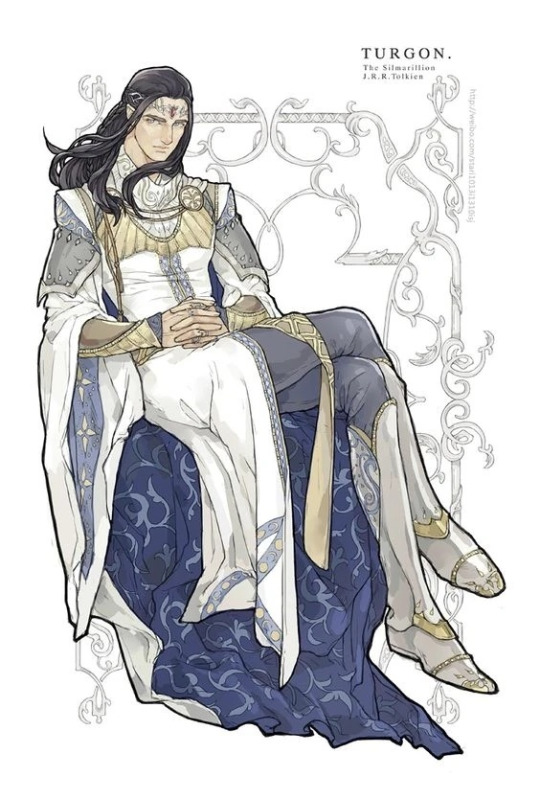
Turgon by _star热爱生活呀巴扎嘿
Eöl just stands silently for several minutes. You could cut the tension with a knife. Then, in a sudden motion, he takes a javelin that he had concealed in his cloak and throws it straight at Maeglin. If he’s gonna die there, he’s taking Maeglin with him. Aredhel jumps in front of her son, and the javelin hits her in the shoulder.
Eöl is instantly beset by guards, who bind him and lead him away. Maeglin is just silent through all this, not knowing how to react. Aredhel and Idril both try to convince Turgon to be merciful during Eöl’s trial, but that night, Aredhel dies. The tip of the javelin was poisoned. Therefore, Turgon shows Eöl no mercy. He sentences him to die by being thrown from the top of the tower. As he falls, he curses Maeglin to have all his efforts fail and to suffer the same fate.
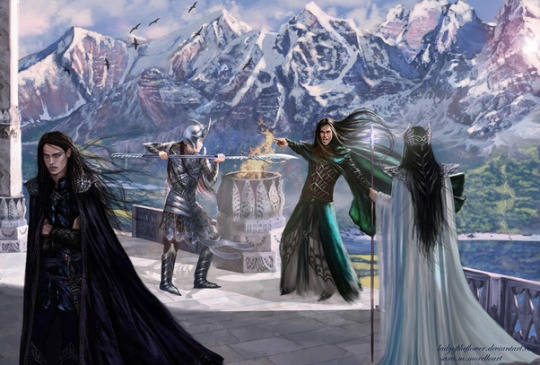
Caragdur - the same fate by SaMo-art
Most of the people of Gondolin believe justice has been served, but Idril is troubled. From that day onward, she distrusts Maeglin.
For the time being, Maeglin’s life is good. He rises through the ranks of Turgon’s court, and Turgon favors him. He finds many valuable metals in the mountains around Gondolin, and forges powerful steel weapons for the people of Gondolin. Maeglin is also wise, tough, and valiant in battle, making him a true asset to Gondolin. All is well… for now.
The only problem is that he’s still in love with Idril, who’s his first cousin. The Noldor don’t marry their cousins, and until now, none of them have wanted to. Idril also doesn’t love him; she can’t help but associate him with his insane father, and she thinks there’s a darkness in him. Somehow, he’s affected by the Curse. Slowly, Maeglin’s love for Idril festers into resentment. I’m sure that won’t cause any problems down the line.
Chapter 17: Of the Coming of Men into the West
In which the Men finally arrive in Beleriand.
It’s been three hundred years since the Noldor first arrived in Beleriand. One day, Finrod Felagund is out exploring the countryside, and he sees cheery campfires and hears the sound of singing. That’s weird, he thinks, the Green Elves who live here don’t light campfires or sing at night. He worries that they might be Orcs, and sneaks closer, but he doesn’t recognize their language. They’re humans, the first Men to enter Beleriand. These Men are the people of Bëor the Old, and they’re singing because they believe that they’ve finally found a paradisal land without fear of Morgoth. Finrod finds them endearing.
When they go to sleep, Finrod sneaks further into their camp, picks up a crudely-carven harp, and begins to play. The Men wake up and are spellbound by the beauty of the faerie king’s music. Finrod sings about the creation of the world, and about Valinor. Although the Men don’t understand his language, images of what he’s singing appear in their minds, and so they learn about how the world was created.
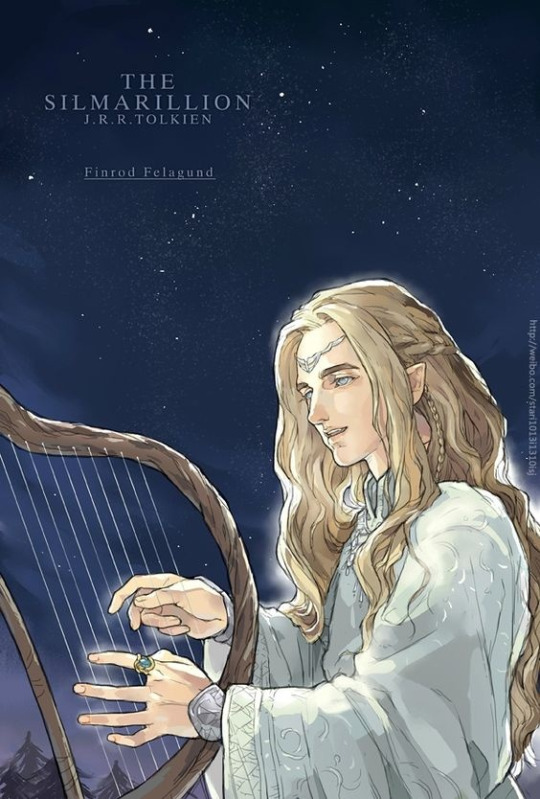
By _star热爱生活呀巴扎嘿
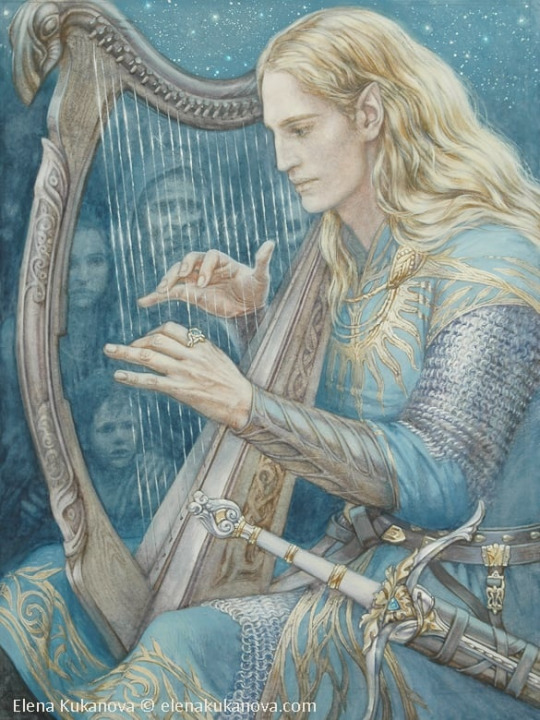
By Elena Kukanova
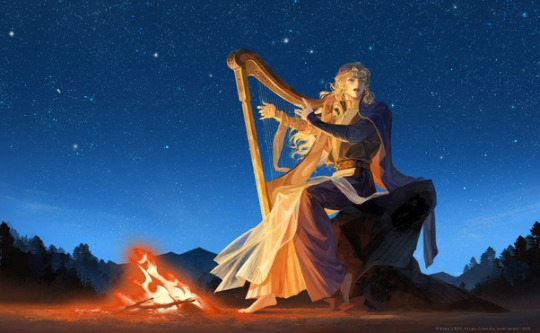
By pan_brooke
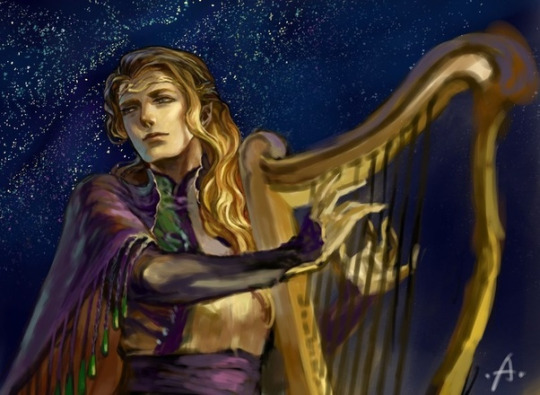
By @pansen1802
(I couldn’t pick just one image for this scene. There are so many good ones!)
After all the Elf Drama that we’ve had to sit through, it’s easy to forget what the Elves really are. They’re the Fair Folk. This scene really speaks to their folkloric roots.
At first, the Men think that Finrod is a Vala, which they’ve heard of. Finrod decides to stay with the Men for some time, in order to teach them things. They call him Nómin, which in their language means “the Wise.” Finrod can understand the Men’s speech realtively easily, because he can read their minds, and because they learned how to speak from the Dark Elves (the Avari) in the east. (This is important because it means that all of the Children of Ilúvatar’s languages descend from the original language of the Elves. It’s the Proto-Indo-European of Middle-earth.)
Finrod asks Bëor why the Men are there. Bëor doesn’t really know, because Men have short lives, and it’s taken many generations for them to get this far. Whatever it was they were fleeing in the first place, it was bad, and they’ve heard enough about Valinor to know that there’s Light in the west. Morgoth did something to corrupt them, as he always does. In fact, as soon as Men arrived in Middle-earth, Morgoth considered this such a big deal that he abandoned the war in Beleriand, putting Sauron in charge of it. Morgoth immediately went to go mess with the Men. Therefore, there’s some human equivalent of the Noldor’s Original Sin of kinslaying. But what it is, no one knows. Bëor tells Finrod that there are more Men heading westwards.
Some of the Green Elves send messengers to Finrod to ask about the Men. They’re not happy that these refugees of an unknown race are moving onto their land. They consider Men their enemies, because the Men cut down trees and kill animals. They tell Finrod to tell the Men to either go back the way they came, or move forward.
Finrod advises the Men to keep moving. They head further West, so that they’re just east of Doriath and just south of Eöl’s dark forest. This is the land that Amrod and Amras, the twin sons of Fëanor, rule over. This land is now called Estolad, “Encampment.” By that point, a year has passed since Finrod first found the Men, and he decides to return home to his own palace, Nargothrond. Bëor begs to come with him and serve him, so he does, leaving his son in charge of the Men.
Soon after, more groups of Men make their way into Beleriand. They settle in whatever little niches they can find amongst the lands that the Elves had divided up amongst themselves. The Elves are extremely interested in the Men, whom they call Edain, “the Second People.” Both Noldor and Sindar alike go to see them. They send messengers to welcome the Men, and some of the Men go to serve in the courts of the Elven kings. Overtime, more and more of them go to serve the Elves.
Thingol, however, is unhappy about the coming of Men. He already was not pleased about the arrival of the Noldor in his lands, even before he found out that they were kinslayers and banned their language. Now, a whole separate group of refugees is invading his kingdom from the other direction, dividing it into even smaller portions. What’s worse, he keeps having troubling dreams about them. The only person he’s willing to talk to about this is Finrod. Thingol decrees that the Men are only allowed to live in the north of Beleriand, and that the Elf lords that they serve are responsible for them. None of the Men are allowed to come into Doriath.
Melian knows that the arrival of Men means that big changes are coming. She whispers to Galadriel that one of the Men will eventually break through her magic wall, because the power of that Man’s destiny will overcome her own. People will sing about that event until the distant future, when Middle-earth is unrecognizable.
Many of the Men are still interested in getting to Valinor, so they can live with the Gods. They’re frustrated and disappointed to know that Valinor is even further west, across the sea. The only God that’s there with them is Morgoth, the Lord of the Dark. (This echoes the Christian idea that God is removed from the world, while Satan is here on earth with us and troubles us while we’re alive.) The Men basically have two options: to try to get across the sea to Valinor, or to try to help the Elves defeat Morgoth.
One Man, Amlach, makes the bold suggestion that there is no Valinor, and that the Elves have been lying to them. The Men have no proof that the Gods exist, and they don’t even have any proof that Morgoth exists beyond the vague evil that their great-grandfathers fled. Maybe it’s the Elves and not Morgoth who want to take over the world! Sound familiar? These are basically all the same conspiracy theories that drove the Noldor out of Valinor.
It’s darkly telling that the source of evil in The Silmarillion is conspiracy theories, lies, misunderstandings, and miscommunications. Morgoth didn’t force the Noldor to kill their relatives — they did that on their own. Now, he’s trying the same tactic all over again with the Men. All he needs to do is sew distrust amongst the people, so that they’ll attack each other instead of him, and destroy everything in the process. This speaks to Tolkien’s general theme about the power of language, but it also seems particularly poignant right now.
Morgoth’s not done yet, though. Despite his best efforts to sew distrust, the friendship between Elves and Men still holds. He decides to try a more direct approach, and sends Orcs to attack a group of Men. The Men are a lot weaker against the Orcs than the Elves are, and they barely survive the siege. Caranthir arrives with the cavalry at the last minute to drive back the Orcs. Caranthir offers the Men protection in his lands in the north. Their leader, Haleth, refuses; she doesn’t want to live under someone else’s rule. She tells Caranthir that she’d rather go further west. She gathers what’s left of her people, and brings them to Estolad.
Haleth leads her people further and further west. They travel through the land north of Doriath, the same poisonous land where Aredhel originally got lost. Many of her people die, and the survivors regret making the journey, but it’s too late to go back now. She tries to restore their way of life best she can.
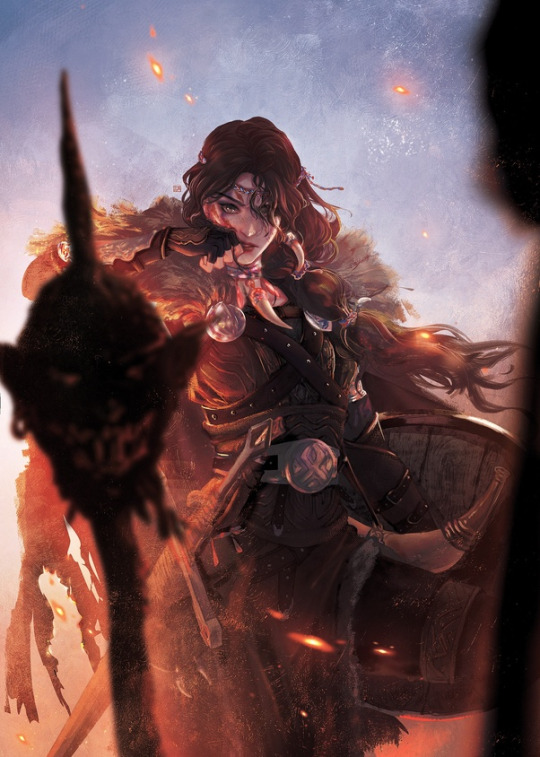
Haleth by @yidanyuan
Now, Haleth and her people are living in a forest called Brethil, northwest of Doriath. This is too close for Thingol’s comfort. Finrod vouches for Haleth and her people, and tells Thingol about the hell that they went through. Thingol reluctantly permits them to live in the forest, so long as they remain outside the magic wall and help defend the forest from Orcs. He worries that the Men and Orcs could become allies and try to attack Doriath. Haleth is disturbed that Thingol would let that thought cross his mind; why would she ally herself with Orcs, after Orcs laid siege to her village and killed her father and brother? If Thingol wants her to kill Orcs, he doesn’t need to tell her twice. She remains in Brethil until she dies, at which point her people build a great barrow for her.
Overtime, the Men learn Sindarin. They remain enthralled by the Elves, and want to learn as much of their lore as possible. But the Elves recognize that Men need to have kingdoms and leaders of their own. The different ethnic groups of Men are therefore given their own lands by the Elven Kings. In addition to Haleth and her people, there are two other important kings of Men:
One of the kings of Men is Hador Lórindol (“Goldenhead”), a member of Fingolfin’s court, whom Fingolfin is fond of. Hador’s people speak both Sindarin and their own language, which eventually evolves into the language of Númenor (which in turn evolves into Westron, the in-universe language that The Lord of the Rings and The Hobbit are written in, rendered as Modern English by our good Professor Tolkien). One of Hador’s sons is named Galdor. Galdor has two sons, Hurin and Huor. They each have a son — Húrin’s son is Túrin, and Huor’s son is Tuor. Tuor has a son, Earendil, whose name should ring a bell. Húrin, Huor, Túrin, and Tuor are all going to be important characters going forward in The Silmarillion. Earendil is the father of Elrond and his brother Elros, and much further down the line, Aragorn will be born from his lineage.
The other important king of Men is Boromir — no, not that one, this one is the son of Bëor the Old. One of his great-great-grandchildren is Morwen, the mother of Túrin, and another one of his great-great-grandchildren is Rían, the mother of Tuor. A third great-great-grandchild is Beren, who’s also a significant character going forward, and his daughter becomes the wife of Earendil, therefore the many-times-great-grandmother of Aragorn.
TL;DR: These two important kings’ grandchildren will marry each other, and their descendants will be the Kings of Numenor, whose line will eventually end with Aragorn. This is where it starts. Also, most of these great-grandchildren are about to become relevant here in the Silm.
Bëor is the first of the Men to die of old age, rather than being killed in battle. The Men are struck by their own mortality. They’re not just vulnerable to being killed — unlike the Elves, they actually have an expiration date. The scope of Men’s lives is barely a hundred years. In the First Age, the Men are practically mayflies. They also have no idea where they go when they die.
Still, the Men that settled in Beleriand are vastly superior to the Men that remained in the East, because they had the opportunity to learn skills, lore, and craftsmanship from the Elves. Also, the men are elevated somewhat just from having seen the Elves’ beautiful faces, because the Elves saw Valinor. Even secondhand, the light of Valinor is just that powerful.
#the silmarillion#the silm#the silm fandom#the silm art#silmarillion#summary#j r r tolkien#the lord of the rings#lotr#finrod#finrod felagund#eol#maeglin#haleth#curufin#celegorm#turgon#aredhel#tolkien#middle earth#elves#tolkien elves#silm elves#beleriand
17 notes
·
View notes
Text
#beren and luthien#beren x luthien#jrr tolkien#lotr books#the silmarillion#lotr#lord of the rings#beren#luthien#luthien tinuviel#beren erchamion#beleriand#first age#lotr poll#tolkien couples
43 notes
·
View notes
Text
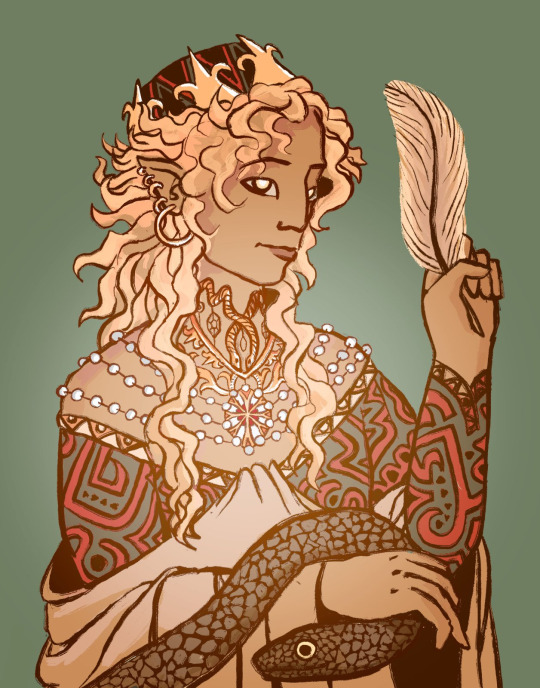
Tolkientober Day 16: Glow
The Nauglamir (Finrod included)
#illustration#art#drawing#painting#silmarillion#lord of the rings#finrod felagund#finrod#tolkien#tolkien elves#tolkien fanart#silm art#house of finarfin#portrait#elves#noldor#nargothrond#nauglamir#the silmarillion#beleriand fashion by someone without a clue about fashion
299 notes
·
View notes
Text
So.... one could say that Old Sindarin is the middle-earth version of Latin since it is considered to possibly be the root of all languages in Beleriand and modern sindarin is the middle-earth equivalent of Italian (in reference to latin)... and Doriath had their own diallect of sindarin... sort of like Naples, Sicily, and Valencia...
#lotr#silmarillion#tolkien#tolkien languages#Tolkien diallects#first age#doriath#lord of the rings#doriathrin#beleriand#middle earth#people of middle earth#sindar elves
27 notes
·
View notes